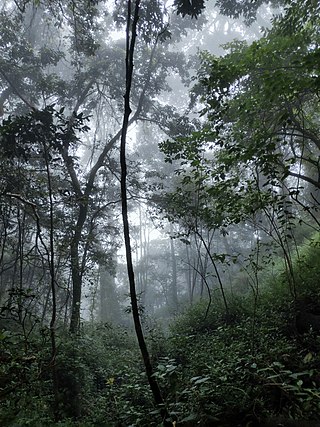Related Research Articles

Logging is the process of cutting, processing, and moving trees to a location for transport. It may include skidding, on-site processing, and loading of trees or logs onto trucks or skeleton cars. In forestry, the term logging is sometimes used narrowly to describe the logistics of moving wood from the stump to somewhere outside the forest, usually a sawmill or a lumber yard. In common usage, however, the term may cover a range of forestry or silviculture activities.

An audit is an "independent examination of financial information of any entity, whether profit oriented or not, irrespective of its size or legal form when such an examination is conducted with a view to express an opinion thereon." Auditing also attempts to ensure that the books of accounts are properly maintained by the concern as required by law. Auditors consider the propositions before them, obtain evidence, and evaluate the propositions in their auditing report.

Illegal logging is the harvest, transportation, purchase, or sale of timber in violation of laws. The harvesting procedure itself may be illegal, including using corrupt means to gain access to forests; extraction without permission, or from a protected area; the cutting down of protected species; or the extraction of timber in excess of agreed limits. Illegal logging is a driving force for a number of environmental issues such as deforestation, soil erosion and biodiversity loss which can drive larger-scale environmental crises such as climate change and other forms of environmental degradation.

The Forest Stewardship Council GmbH (FSC) is an international non-profit, multistakeholder organization established in 1993 that promotes responsible management of the world's forests via timber certification. This organization uses a market-based approach to transnational environmental policy.

Certified wood and paper products come from responsibly managed forests – as defined by a particular standard. With third-party forest certification, an independent standards setting organization (SSO) develops standards for good forest management, and independent auditing companies issue certificates to forest operations that comply with those standards.

Forestry laws govern activities in designated forest lands, most commonly with respect to forest management and timber harvesting. Forestry laws generally adopt management policies for public forest resources, such as multiple use and sustained yield. Forest management is split between private and public management, with public forests being sovereign property of the State. Forestry laws are now considered an international affair.

MacMillan Bloedel Limited was a Canadian forestry company headquartered in Vancouver, British Columbia. The company was formed in 1951 as MacMillan and Bloedel through the merger of Bloedel, Stewart and Welch with the H. R. MacMillan Export Company. MacMillan and Bloedel then merged in 1959 with the Powell River Company to form MacMillan, Bloedel and Powell River, before adopting its final name in 1966. It was acquired by Weyerhaeuser in 1999.

The Great Bear Rainforest is a temperate rain forest on the Pacific coast of British Columbia, comprising 6.4 million hectares. It is part of the larger Pacific temperate rainforest ecoregion, which is the largest coastal temperate rainforest in the world.

Sustainable forest management (SFM) is the management of forests according to the principles of sustainable development. Sustainable forest management has to keep the balance between three main pillars: ecological, economic and socio-cultural. The goal of sustainable forestry is to allow for a balance to be found between making use of trees and also maintaining natural patterns of disturbance and regeneration. The forestry industry mitigates climate change by boosting carbon storage in growing trees and soils and improving the sustainable supply of renewable raw materials via sustainable forest management. Successfully achieving sustainable forest management will provide integrated benefits to all, ranging from safeguarding local livelihoods to protecting biodiversity and ecosystems provided by forests, reducing rural poverty and mitigating some of the effects of climate change. Forest conservation is essential to stop climate change.

The British Columbia Lottery Corporation is a Canadian Crown corporation offering a range of gambling products including lottery tickets, casinos and legal online gambling. It is based in Kamloops, with a secondary office in Vancouver. It consists of three business units, Lottery, Casino and eGaming; and five support divisions, Human Resources, Information Technology, Compliance & Security, Finance, and Communications. Its annual revenues exceed CDN $3.1 billion. It has 890 direct employees. Its service providers, who run casinos on its behalf under contract, have an additional 8,300 employees.
Forestry Innovation Investment Ltd. (FII) is a provincial government funded company of the province of British Columbia, Canada.

The Sustainable Forestry Initiative (SFI) is a sustainability organization operating in the U.S. and Canada that works across four pillars: standards, conservation, community, and education. SFI was founded in 1994 by the American Forest & Paper Association (AF&PA). SFI is the world's largest single forest certification standard by area. SFI is headquartered in Ottawa and Washington, D.C.
The Yale Center for Environmental Law & Policy is a joint initiative between the Yale School of Forestry & Environmental Studies and the Yale Law School.

Doug Donaldson is a Canadian politician, who represented the Stikine electoral district Legislative Assembly of British Columbia from 2009 to 2020. He is a member of the British Columbia New Democratic Party and was first elected as a Member of the Legislative Assembly in the 2009 election and re-elected in the 2013 and 2017 elections. During the 41st Parliament (2017-2020) he served in the Executive Council as the Minister of Forests, Lands and Natural Resource Operations, and Rural Development. In that role he led the government through adopted several bills including amending the Heritage Conservation Act to create a legal duty-to-report discoveries of specific sites or objects with potential heritage value and amending the Forest Act to insert consideration of the "public interest" in decisions to approve the forestry dispositions. As a member of the official opposition in the 39th and 40th Parliaments he served in various critic and deputy roles at different times, such as on issues relating to mines, energy, finance and children and family development issues. He introduced one private member bill to amend the Oil and Gas Activities Act to prohibit the conversion of natural gas pipelines to transmit oil or diluted bitumen.
Commission on Resources and Environment (CORE) was a collaborative planning model used in British Columbia from 1992-1996. Participating stakeholders negotiated a consensus-based agreement about regional and local resource use goals. CORE's Commissioner was Stephen Owen, former provincial Ombudsdman. CORE was formed by NDP Premier Michael Harcourt. These collaborative processes focused on four British Columbia regions: Vancouver Island, the Cariboo-Chilcotin, and the East and West Kootenays. The accomplishments of each region was varied, but none were able to reach full agreement on land use designation.

The Ancient Forest Alliance is a grassroots environmental organization in British Columbia, Canada. It was founded in January 2010, and is dedicated to protecting British Columbia's old-growth forests in areas where they are scarce, and ensuring sustainable forestry jobs in that province.

Deforestation in Papua New Guinea has been extensive and in recent decades from 2001 to 2020, Papua New Guinea lost 1.57Mha of tree cover, equivalent to a 3.7% decrease in tree cover since 2000, and 1.15Gt of CO₂e emissions.

The deforestation in British Columbia has occurred at a heavy rate during periods of the past, but with new sustainable efforts and programs the rate of deforestation is decreasing in the province. In British Columbia, forests cover over 55 million hectares, which is 57.9% of British Columbia's 95 million hectares of land. The forests are mainly composed of coniferous trees, such as pines, spruces and firs.

The Canadian forestry industry is a major contributor to the Canadian economy. With 39% of Canada's land acreage covered by forests, the country contains 9% of the world's forested land. The forests are made up primarily of spruce, poplar and pine. The Canadian forestry industry is composed of three main sectors: solid wood manufacturing, pulp and paper and logging. Forests, as well as forestry are managed by The Department of Natural Resources Canada and the Canadian Forest Service, in cooperation with several organizations which represent government groups, officials, policy experts, and numerous other stakeholders. Extensive deforestation by European settlers during the 18th and 19th centuries has been halted by more modern policies. Today, less than 1% of Canada's forests are affected by logging each year. Canada is the 2nd largest exporter of wood products, and produces 12.3% of the global market share. Economic concerns related to forestry include greenhouse gas emissions, biotechnology, biological diversity, and infestation by pests such as the mountain pine beetle.

British Columbia (B.C.) is the third largest Canadian province by population and fourth largest provincial economy. Like other provinces in the Canadian federation, B.C. consists of both private and public institutions. However, as Canada's westernmost province, located between the Pacific Ocean and the Rocky Mountains, B.C. has unique economic characteristics that distinguish it from much of the rest of Canada.
References
- ↑ Gordon Hamilton, "Deal with urban wildfire risks now, forest watchdog warns," Vancouver Sun, Feb. 4, 2010, p. E5.
- ↑ Schreckenberg, K. (2006) Legal Timber, Verification in the Forest Sector of British Columbia, VERIFOR Country Case Study No. 2 London: Overseas Development Institute (as appears in LEGAL TIMBER, Verification and Governance in the Forest Sector, p. 75).
- ↑ Global Environmental Forest Policies: An International Comparison By Constance McDermott, Benjamin William Cashore, Peter Kanowski
- ↑ Justice D. Brenner, Northwood Inc. v. British Columbia (Forest Practices Board), 1999 CANLII 2003 (BCSC), aff'd 2001 BCCA 141
- ↑ In Search of Sustainability: British Columbia Forest Policy in the 1990s By Professor Benjamin Cashore
- ↑ Forest and Range Practices Act (2002), SBC Chap. 69, Part 8.
- ↑ BC Timber Sales" forestry operations in British Columbia, pass Forest Practices Board audit - Lesprom Network
- ↑ Forest and Range Practices Act, s. 131
- ↑ " Road building puts water quality at risk in some B.C. communities". Mark Hume, Vancouver. The Globe and Mail
- ↑ "Times Colonist – Thumbs Up To the Forest Practices Board – British Columbia Ancient Forests". Archived from the original on 2018-10-12. Retrieved 2014-02-28.
- ↑ BC's Sustainable Forest Management and Certification| naturally:wood
- ↑ Forest Practices Board announces appointment | Windspeaker - AMMSA: Indigenous news, issues and culture [ permanent dead link ]
- ↑ New chair, two renewals for Forest Practices Board | BC Newsroom